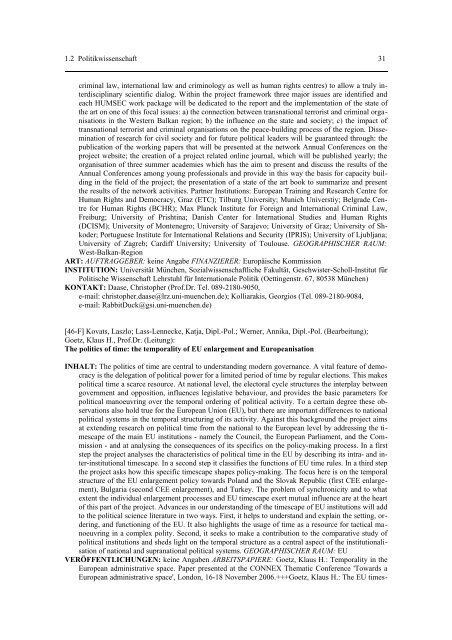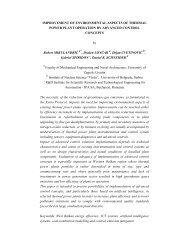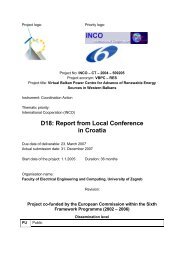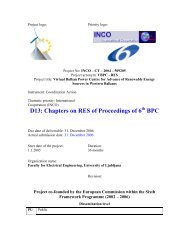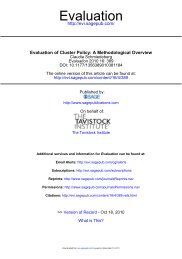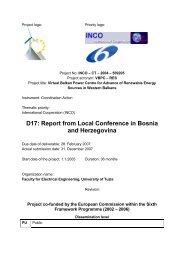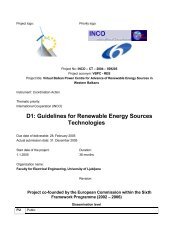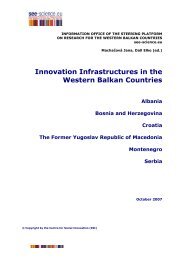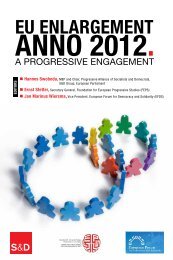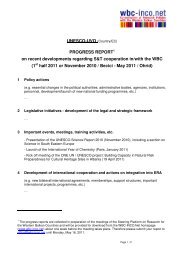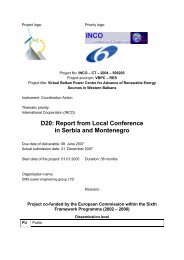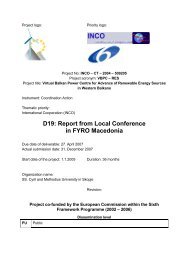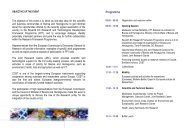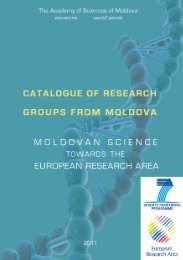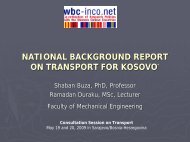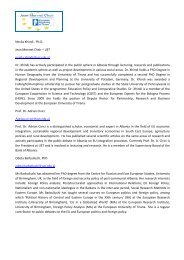Download - WBC-INCO Net
Download - WBC-INCO Net
Download - WBC-INCO Net
Erfolgreiche ePaper selbst erstellen
Machen Sie aus Ihren PDF Publikationen ein blätterbares Flipbook mit unserer einzigartigen Google optimierten e-Paper Software.
1.2 Politikwissenschaft 31<br />
criminal law, international law and criminology as well as human rights centres) to allow a truly interdisciplinary<br />
scientific dialog. Within the project framework three major issues are identified and<br />
each HUMSEC work package will be dedicated to the report and the implementation of the state of<br />
the art on one of this focal issues: a) the connection between transnational terrorist and criminal organisations<br />
in the Western Balkan region; b) the influence on the state and society; c) the impact of<br />
transnational terrorist and criminal organisations on the peace-building process of the region. Dissemination<br />
of research for civil society and for future political leaders will be guaranteed through: the<br />
publication of the working papers that will be presented at the network Annual Conferences on the<br />
project website; the creation of a project related online journal, which will be published yearly; the<br />
organisation of three summer academies which has the aim to present and discuss the results of the<br />
Annual Conferences among young professionals and provide in this way the basis for capacity building<br />
in the field of the project; the presentation of a state of the art book to summarize and present<br />
the results of the network activities. Partner Institutions: European Training and Research Centre for<br />
Human Rights and Democracy, Graz (ETC); Tilburg University; Munich Universtiy; Belgrade Centre<br />
for Human Rights (BCHR); Max Planck Institute for Foreign and International Criminal Law,<br />
Freiburg; University of Prishtina; Danish Center for International Studies and Human Rights<br />
(DCISM); University of Montenegro; University of Sarajevo; University of Graz; University of Shkoder;<br />
Portuguese Institute for International Relations and Security (IPRIS); University of Ljubljana;<br />
University of Zagreb; Cardiff University; University of Toulouse. GEOGRAPHISCHER RAUM:<br />
West-Balkan-Region<br />
ART: AUFTRAGGEBER: keine Angabe FINANZIERER: Europäische Kommission<br />
INSTITUTION: Universität München, Sozialwissenschaftliche Fakultät, Geschwister-Scholl-Institut für<br />
Politische Wissenschaft Lehrstuhl für Internationale Politik (Oettingenstr. 67, 80538 München)<br />
KONTAKT: Daase, Christopher (Prof.Dr. Tel. 089-2180-9050,<br />
e-mail: christopher.daase@lrz.uni-muenchen.de); Kolliarakis, Georgios (Tel. 089-2180-9084,<br />
e-mail: RabbitDuck@gsi.uni-muenchen.de)<br />
[46-F] Kovats, Laszlo; Lass-Lennecke, Katja, Dipl.-Pol.; Werner, Annika, Dipl.-Pol. (Bearbeitung);<br />
Goetz, Klaus H., Prof.Dr. (Leitung):<br />
The politics of time: the temporality of EU enlargement and Europeanisation<br />
INHALT: The politics of time are central to understanding modern governance. A vital feature of democracy<br />
is the delegation of political power for a limited period of time by regular elections. This makes<br />
political time a scarce resource. At national level, the electoral cycle structures the interplay between<br />
government and opposition, influences legislative behaviour, and provides the basic parameters for<br />
political manoeuvring over the temporal ordering of political activity. To a certain degree these observations<br />
also hold true for the European Union (EU), but there are important differences to national<br />
political systems in the temporal structuring of its activity. Against this background the project aims<br />
at extending research on political time from the national to the European level by addressing the timescape<br />
of the main EU institutions - namely the Council, the European Parliament, and the Commission<br />
- and at analysing the consequences of its specifics on the policy-making process. In a first<br />
step the project analyses the characteristics of political time in the EU by describing its intra- and inter-institutional<br />
timescape. In a second step it classifies the functions of EU time rules. In a third step<br />
the project asks how this specific timescape shapes policy-making. The focus here is on the temporal<br />
structure of the EU enlargement policy towards Poland and the Slovak Republic (first CEE enlargement),<br />
Bulgaria (second CEE enlargement), and Turkey. The problem of synchronicity and to what<br />
extent the individual enlargement processes and EU timescape exert mutual influence are at the heart<br />
of this part of the project. Advances in our understanding of the timescape of EU institutions will add<br />
to the political science literature in two ways. First, it helps to understand and explain the setting, ordering,<br />
and functioning of the EU. It also highlights the usage of time as a resource for tactical manoeuvring<br />
in a complex polity. Second, it seeks to make a contribution to the comparative study of<br />
political institutions and sheds light on the temporal structure as a central aspect of the institutionalisation<br />
of national and supranational political systems. GEOGRAPHISCHER RAUM: EU<br />
VERÖFFENTLICHUNGEN: keine Angaben ARBEITSPAPIERE: Goetz, Klaus H.: Temporality in the<br />
European administrative space. Paper presented at the CONNEX Thematic Conference 'Towards a<br />
European administrative space', London, 16-18 November 2006.+++Goetz, Klaus H.: The EU times-


